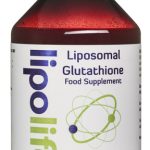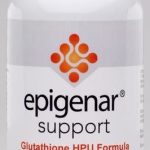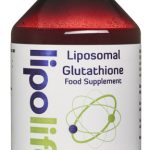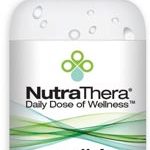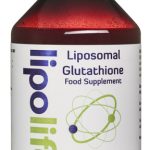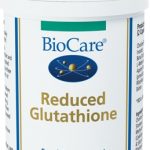Let’s be honest, the likelihood is you’ve never heard of glutathione. Why should you have? It’s not a vitamin, is it? Well, no. But it is a simple molecule – specifically, a peptide – to be found in every cell in the human body that comprises three amino acids (cysteine, glutamine and glycine). Fair enough; but if it’s as simple as all that, why’s it worthy of mention? Basically, because scientists believe it’s so important to humans and their health that they’ve suggested that the levels of glutathione in the body’s cells are an excellent predictor of life expectancy – that is, how much glutathione you have in your cells may greatly suggest how long you’ll live1, 2. All the more reason to boost your levels of the chemical through natural supplementation so they don’t run too low? Absolutely!
So, what is it about glutathione that makes it so essential to the healthy functioning of the human body? Why is its presence in the body’s cells so significant? Well, the reality is that this little substance helps to do a great many important things – here are eight of the most common and crucial of them…
Benefits of glutathione
-
Fights oxidative stress
You may have heard of the awesome antioxidant properties of both Vitamins C and E, but don’t doubt it; glutathione is just as impressive and important an antioxidant – not least because it likes nothing more than locating itself right inside cells, the ideal position to do this work1. As an antioxidant then, it plays a critical role in reducing oxidative stress. It removes from the body free radicals and other reactive oxygen species (ROS) and defends against the harmful effects of toxic xenobiotics (such as carcinogens, pollutants and drugs); all of which contributes to protecting the body’s cells and DNA from damage and the body’s systems from deterioration and diseases – including, it’s believed, Parkinson’s, Alzheimer’s and some cancers 1, 2, 3. And, as if that wasn’t enough, it’s also great for helping regenerate other antioxidants; the likes of the aforementioned Vitamins C and E.
-
Helps anti-aging
Free radicals, mentioned above, can cause much harm in the body because they like to find other health-benefitting molecules with which to pair off and ensure the latter become useless. To that end, among the myriad problems this can cause is the fact it contributes to the aging process – something then that replenished glutathione levels can naturally mitigate against1. Specifically, it’s believed that when glutathione levels are low, the efficacy of the immune system’s compromised, which speeds up the aging process – and the knock-on effect of this is that, as it ages, the body naturally produces less glutathione to keep itself healthy and, yes, ‘younger’1. Plus, it’s been posited that the drop-off in glutathione generation during the menopause may be a factor in why women tend to age dramatically during this time of life1.
-
May aid brain health
Owing to the fact the brain tends to consume around 20% – that’s one fifth – of the oxygen absorbed into and created in the body, it’s critically important your glutathione levels remain high to ensure reactive oxygen species are detoxified here; indeed, research suggests that unless this takes place effectively the likelihood of the following brain-related diseases increases1:
- Alzheimer’s disease – in part caused by oxidative stress (proved by the fact that oral Vitamin E intake can slow its progression1, 2), Alzheimer’s is notable for the DNA-binding protein TDP-43 amassing in the nervous system, a result of which is a reduction in glutathione in the body1 (creating then, yes, a vicious circle). That said, glutathione can treat symptoms of the disease – a study proved that in mice, a gluthatione-level-boosting protein increased memory in mice suffering with Alzheimer’s1.
- Parkinson’s disease – again, in part, brought on by oxidative stress (specifically in the nervous system); Parkinson’s, so research has proved, ensures sufferers experience a deficit of glutathione in a specific part of the brain linked to the disease1.
- Huntington’s disease – it seems it may also be possible to thwart this disease, once again caused by oxidative stress (in addition to mitochondrial dysfunction)1, in part by increasing the body’s glutathione levels so as to improve mitochondrial health1.
-
May help fight infections
Reduced levels of glutathione in the body can also worsen the effect of viral infections, as it helps enable the infecting bacteria and parasites to run amok and cause abnormal amounts of oxidative stress in cells1, 2. Moreover, depleted glutathione means, as mentioned, a less effective immune system, which results in more virulent infections and worse inflammation, (certainly, for instance, in the case of influenza, cystic fibrosis, tuberculosis and AIDS)1. Additionally, one study has proved that keeping the body’s amino acid cysteine content (and thus the glutathione content) high, enhances the destruction of harmful, infection-causing mycobacteria1.
-
May enhance gut health
The glutathione compound, glutathione peroxidase, is a crucial ingredient in the natural renewal of the gut wall (thereby helping to prevent leaky gut, which occurs when the gut wall becomes weakened)1, while it’s known that the peptide also works to protect the intestinal mucosa from harmful alien elements1. Plus, there may be a linkage between glutathione deficiency and the development of irritable bowel syndrome (IBS) – its sufferers appear to experience less activity of the enzymes that feature in the glutathione synthesis process and have reduced levels of the glutathione building block, cysteine1.
-
May help prevent heart disease
Research has showed that an increased risk of heart attack can be linked to deficient amounts of both systemic and cardiac glutathione, as well as reduced activity of glutathione peroxidase in the body1, 2, 3, while cardiovascular disease is, to a large extent, the result of oxidative stress traced to the heart tissues (itself far less likely to take place, as is a stroke, if a body contains healthily high levels of glutathione with all its antioxidant duties1).
-
May treat diabetic problems
There’s a very strong linkage between the accumulation of free radicals in the body and many harmful complications connected to type-2 diabetes (cardiovascular issues and neurodegeneration); thus, increased glutathione intake can definitely limit (if nor prevent) these complications1. Indeed, as with Alzheimer’s disease (above), a vicious circle can be created via glutathione deficiency and type-2 diabetes as, while the former can help cause the latter, type-2 diabetes and high blood sugar go on to reduce the body’s glutathione content1.
-
May combat rheumatoid arthritis symptoms
Finally, not only has research suggested that antioxidant mechanisms may be compromised in the bodies of rheumatoid arthritis sufferers, but also that – unsurprisingly – their glutathione levels may be significantly lower than average1; to match the high demand their bodies have for the chemical then, it more than makes sense to top up their glutathione levels via supplementation.
Glutathione supplements
That said, as should now be clear, it makes perfect sense for everybody to try and ensure their glutathione levels are healthily high – so many potential ailments are its deficiency linked to. But how might you go about this? Naturally-derived supplementation is the answer – rather than any unnecessarily artificial alternative. By all means, take a look at the ‘Glutathione’ page on our website to check out the range of products available through us at The Finchley Clinic, which includes the following three examples:
Liposomal Glutathione – supplies the body’s primary detoxifier via a state-of-the-art supplement development process resulting in an extremely highly absorbable form of the chemical.
Epigenar Glutathione HPU – offers a reduced form of glutathione, but in a supplement also comprising zinc, magnesium, Vitamin B6, manganese, selenium, copper SOD and catalase.
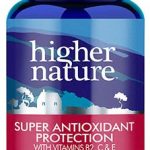 Super Antioxidant Protection – a powerful formula that delivers the key antioxidant nutrients that are Vitamins C and E and glutathione, in addition to the key glutathione building-block N-acetyl cysteine as well as Vitamin B2, zinc, manganese and selenium.
Super Antioxidant Protection – a powerful formula that delivers the key antioxidant nutrients that are Vitamins C and E and glutathione, in addition to the key glutathione building-block N-acetyl cysteine as well as Vitamin B2, zinc, manganese and selenium.
References:
- Kern J. K., Geier D. A., Adams J. B., Garver C. R., Audhya T. and Geier M. R. ‘A clinical trial of glutathione supplementation in autism spectrum disorders’. Med Sci Monit. 2011; 17 (12): CR677–682. Published online 2011 Dec. doi: 10.12659/MSM.882125.
- Cascella R., Evangelisti E., Zampagni M., Becatti M., D’Adamio G., Goti A., Liguri G., Fiorillo C. and Cecchi C. ‘S-linolenoyl glutathione intake extends life-span and stress resistance via Sir-2.1 upregulation in Caenorhabditis elegans’. Free Radic Biol Med. 2014 Aug; 73: 127-35. doi: 10.1016/j.freeradbiomed.2014.05.004. Epub 2014 May.
- Perricone C., De Carolis C. and Perricone R. ‘Glutathione: a key player in autoimmunity’. Autoimmun Rev. 2009 Jul; 8 (8): 697-701. doi: 10.1016/j.autrev.2009.02.020. Epub 2009 Feb 13.

